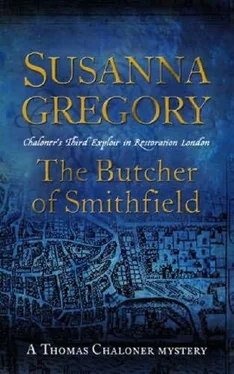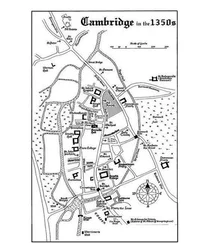Susanna Gregory - The Butcher Of Smithfield
Здесь есть возможность читать онлайн «Susanna Gregory - The Butcher Of Smithfield» весь текст электронной книги совершенно бесплатно (целиком полную версию без сокращений). В некоторых случаях можно слушать аудио, скачать через торрент в формате fb2 и присутствует краткое содержание. Год выпуска: 2010, ISBN: 2010, Издательство: Little, Brown Book Group, Жанр: Исторический детектив, на английском языке. Описание произведения, (предисловие) а так же отзывы посетителей доступны на портале библиотеки ЛибКат.
- Название:The Butcher Of Smithfield
- Автор:
- Издательство:Little, Brown Book Group
- Жанр:
- Год:2010
- ISBN:9780748124541
- Рейтинг книги:5 / 5. Голосов: 1
-
Избранное:Добавить в избранное
- Отзывы:
-
Ваша оценка:
- 100
- 1
- 2
- 3
- 4
- 5
The Butcher Of Smithfield: краткое содержание, описание и аннотация
Предлагаем к чтению аннотацию, описание, краткое содержание или предисловие (зависит от того, что написал сам автор книги «The Butcher Of Smithfield»). Если вы не нашли необходимую информацию о книге — напишите в комментариях, мы постараемся отыскать её.
The Butcher Of Smithfield — читать онлайн бесплатно полную книгу (весь текст) целиком
Ниже представлен текст книги, разбитый по страницам. Система сохранения места последней прочитанной страницы, позволяет с удобством читать онлайн бесплатно книгу «The Butcher Of Smithfield», без необходимости каждый раз заново искать на чём Вы остановились. Поставьте закладку, и сможете в любой момент перейти на страницу, на которой закончили чтение.
Интервал:
Закладка:
As Chaloner stepped inside, the shopkeeper left the customer he was serving and came to greet the new arrival. He was tall, with thinning ginger hair that was mostly concealed by a brown wig. His eyes were a pleasant shade of green, and he wore spectacles on a chain around his neck. When he smiled, his teeth were white and even. He introduced himself as Henry Brome, and politely asked if Chaloner would mind waiting a few moments until he had finished dealing with Mr Smith. A copy of The Intelligencer was provided in the meantime, which Brome said had come directly from the printing presses that morning. It was a refreshing change from being ignored until the first client had left, as happened in most shops.
The spy sat at a table and scanned the newsbook’s contents. There were reports from Paris, Denmark and Vienna, and a note about the Queen’s health, but most of the eight pages were given over to a tirade about an uprising of phanatiques in York, Richmond and Preston. Chaloner grinned when he read, I will not trouble you with hear-says and Reports, but …’ and the editor then went on to give a great list of unsubstantiated rumours.
‘A bright bay mare,’ said the customer, when Brome returned to him. ‘Twelve hands high, with three white feet and wall-eyes. And you can say there is a reward of twenty shillings for her safe return, on application to Richard Smith at the Bell in Smithfield. That is me.’
Brome finished writing down the instructions and smiled. ‘I shall make sure the notice appears in Thursday’s Newes , Mr Smith. And I hope it brings you luck.’
‘I believe it might,’ replied Smith. ‘When Captain Hammond lost his gelding, one of your advertisements saw it back within three days ! Making news of horse-thievery means it is more difficult for these villains to operate, and you are doing us a great service.’
‘I am delighted to hear it,’ said Brome. He looked pained. ‘Of course, the real function of our newsbooks is not to help find missing horses, but to keep the public informed of current affairs.’
Smith laughed, long and hard. ‘Believe me, Brome, no one buys the newsbooks for their coverage of current affairs! We buy them for the horses, and anyone who tells you otherwise is a liar. And speaking of horses, you can write that mine was stolen by a villain called Edward Treen. One of my servants saw him quite clearly, but he managed to ride off before we could stop him. Make sure you name Treen.’
‘We had better not,’ said Brome, rather wearily. ‘He might sue you for defamation of character, and the courts cannot be relied upon to dispense just verdicts these days. It is safer to leave the notice as it is.’
‘Very well,’ said Smith, pushing several coins across the table, which Brome counted carefully before making an entry in a ledger. ‘Do you want me to sign anything before I go?’
‘Here, to say you have handed me the sum of five shillings,’ said Brome, pointing at the book.
‘You are wise to keep records, because they will protect you against allegations ,’ said Smith darkly. ‘I knew L’Estrange during the wars, and he is a devil for thinking the worst of people. I heard in my coffee house yesterday that he has accused Muddiman of stealing his news.’
Brome regarded him uneasily. ‘But Muddiman does steal his news — he pre-empted us with a report from Tangier only last week. That is theft, just as you losing your bay mare is theft.’
‘It is not the same at all,’ said Smith dismissively. ‘A horse cannot be compared to an item of foreign gossip. I was sorry to hear about Newburne, by the way. You must be very upset.’
‘L’Estrange will miss him,’ was all Brome said in reply.
When Smith had gone, Brome turned to Chaloner with a smile, apologising for the delay and asking whether he had come to order a book, apply for a publishing license, or buy advertising space.
‘I have come to see Roger L’Estrange,’ replied Chaloner.
‘May I ask why?’ Brome shrugged sheepishly when Chaloner raised his eyebrows at the question. ‘I mean no disrespect, but it will be better for everyone if you tell me your business first. The last man I allowed in without an appointment transpired to be a phanatique, and the poor fellow was lucky to escape with one of his ears still attached.’
From the rabid tone of the newsbooks and what he had witnessed outside the Rainbow Coffee House, Chaloner was not surprised to learn L’Estrange was in the habit of turning violent when confronted with people of whom he disapproved. ‘The Lord Chancellor asked me to see him regarding the release of information from Portugal. My name is Thomas Heyden.’
Brome brightened. ‘Original news? Excellent! That will put him in a good mood, and it is kind of the Lord Chancellor to think of us. Are you one of his secretaries? A diplomatic emissary, perhaps?’
‘Just a clerk.’
Brome regarded him astutely. ‘He does not send minions to foreign countries on his behalf, so you must be either relatively senior or trusted. But no matter; I can see from your expression that you would rather not discuss it. We are grateful for any accurate information, regardless of its origin.’
Chaloner changed the subject. Brome’s wits were sharp, and he did not want the man guessing he was a spy. ‘You said L’Estrange was visited by a phanatique. Do many pay him court, then?’
The bookseller grinned, a little conspiratorially. ‘They do, according to him. However, you must be aware that a phanatique is anyone even remotely sympathetic to Puritans, Roundheads or regicides. I am one at the moment, because I said it is time Cromwell’s skull was removed from the pole outside Westminster Hall. However, my suggestion has more to do with its nasty habit of blowing down in the wind than with any respect I might have had for its owner. The thing almost brained my wife last week, and most Londoners consider it something of a hazard.’
Chaloner hoped Thurloe did not venture that way during storms, because he and Cromwell had been friends. ‘Is it true that a licence is needed to print any book or pamphlet in London now?’ he asked, wanting to learn more about L’Estrange’s official business before he met the man.
‘In the country,’ corrected Brome. ‘And not only is it illegal to manufacture a text without a licence from the Surveyor of the Press — L’Estrange — but it is against the law to sell them, too.’
‘I understand there are six hundred booksellers in the City alone,’ said Chaloner artlessly. ‘How does he regulate them all?’
‘There are only fifty now,’ said Brome. He looked away, and Chaloner was under the impression that he thought it a pity. ‘He hires men to visit the bookshops and ensure they only hawk legitimate tomes. Of course, these rules only apply to the printed word. He cannot control manuscripts — handwritten texts — such as the newsletters dictated by Muddiman to his army of scribes.’
‘Do you read any newsletters?’
‘No, of course not,’ said Brome, somewhat cagily. ‘That would be disloyal, because they are in direct competition with the official government newsbooks.’
Casually, Chaloner leaned forward and tweaked a sheet of paper from under the ledger, stepping away smartly when Brome tried to snatch it back. Like all newsletters, it was addressed to a specific recipient — something a scribe could do, but that was impractical for a printing press — and the author’s name and address were carried banner-like across the top of the first page. In this case, the writer was Henry Muddiman, and his correspondent was Samuel Pepys.
Brome’s face was scarlet with mortification. ‘That is … that is not mine.’
Читать дальшеИнтервал:
Закладка:
Похожие книги на «The Butcher Of Smithfield»
Представляем Вашему вниманию похожие книги на «The Butcher Of Smithfield» списком для выбора. Мы отобрали схожую по названию и смыслу литературу в надежде предоставить читателям больше вариантов отыскать новые, интересные, ещё непрочитанные произведения.
Обсуждение, отзывы о книге «The Butcher Of Smithfield» и просто собственные мнения читателей. Оставьте ваши комментарии, напишите, что Вы думаете о произведении, его смысле или главных героях. Укажите что конкретно понравилось, а что нет, и почему Вы так считаете.












